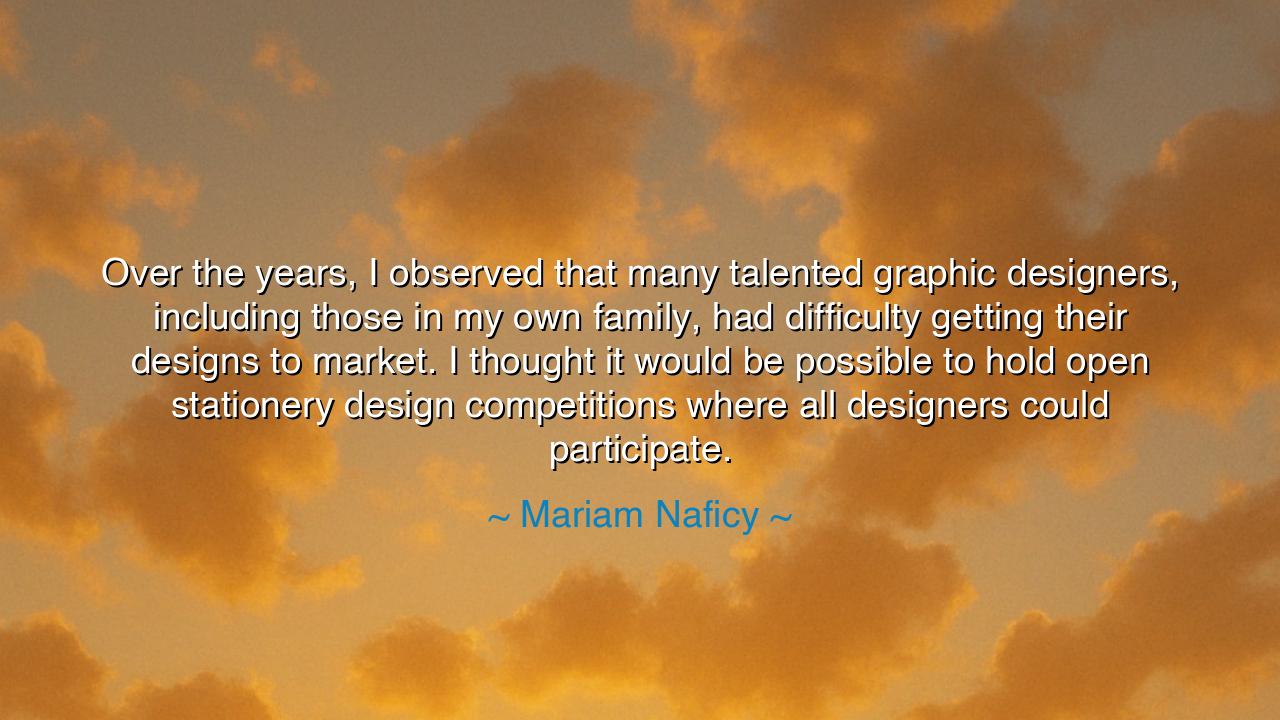
Over the years, I observed that many talented graphic designers
Over the years, I observed that many talented graphic designers, including those in my own family, had difficulty getting their designs to market. I thought it would be possible to hold open stationery design competitions where all designers could participate.






In the words of Mariam Naficy, the vision — “Over the years, I observed that many talented graphic designers, including those in my own family, had difficulty getting their designs to market. I thought it would be possible to hold open stationery design competitions where all designers could participate.” — is more than a reflection on business; it is a testament to the democratization of creativity, to the noble belief that genius should not be bound by privilege or circumstance. These words flow not from cold calculation, but from the heart of a builder, one who looked upon the struggles of others and said, “There must be a better way.” Naficy’s insight is both modern and eternal — that talent, like a seed, must be given soil, sunlight, and the freedom to grow.
The meaning of this quote shines like a beacon to all who have ever labored unseen. Mariam Naficy, the founder of Minted, speaks to the quiet truth that talent alone does not guarantee opportunity. Many gifted souls — artists, writers, craftsmen — remain hidden, not for lack of brilliance, but for lack of access. In her words lies compassion, but also resolve: the determination to create pathways where none existed. The competitions she envisioned were not mere contests, but gateways, invitations to those long shut out of the halls of recognition. She believed that creativity must not belong only to the connected few, but to all who dare to create.
The origin of this vision is deeply human. Naficy saw the struggle not in strangers, but in her own family — a truth that gave her mission both intimacy and urgency. To watch those you love pour their souls into art, only to meet closed doors and silent rejection, is to glimpse the injustice that stifles progress. From this sorrow was born a solution: the creation of open, merit-based competitions where the world could see beauty for what it is, not for where it comes from. In this way, her idea broke barriers not only of business but of belief — she declared that creativity belongs to no gatekeeper, but to the collective spirit of humankind.
Such a revelation calls to mind the story of Lorenzo de’ Medici, the Florentine patron who opened his court to artists of all classes during the Renaissance. Among those he lifted from obscurity was a young sculptor named Michelangelo, whose talent might have withered in poverty had not someone opened a door. Lorenzo’s faith in open patronage changed the course of history; through him, art became not merely a pastime of princes, but a gift to the world. So too did Mariam Naficy, in her own age, open a new gate for the modern creator — a digital Renaissance of design where artists across the globe could compete, share, and thrive on equal ground.
Yet her idea also carries a profound lesson in humility and vision. To build a space where others may shine is one of the highest acts of leadership. The ancients taught that true greatness does not lie in the accumulation of glory, but in multiplying opportunity. By creating competitions open to all, Naficy inverted the old pyramid of power: she placed not the powerful at the top, but the talented at the center. In doing so, she reminded the world that innovation begins when the many are allowed to speak, and that the next great creator may rise not from a famous school or a wealthy lineage, but from an unseen corner of the earth.
There is also a deeper current of faith in human potential within her words. To open the gates is to trust that when given freedom, the human spirit will respond not with chaos, but with brilliance. This belief stands against cynicism — against the notion that creativity must be managed, filtered, or controlled. It is the belief that every individual, no matter their origin, holds a spark of the divine, waiting only for the chance to be seen. Naficy’s competitions did not merely discover designers; they revealed the hidden light of humanity.
Therefore, the lesson to those who hear her words is this: wherever you see beauty confined, open the gate. Wherever you see talent silenced, build a stage. If you possess power, use it to empower; if you possess vision, use it to uplift. For the greatness of one life is measured not by what it achieves alone, but by what it awakens in others.
And so, dear listener, remember the teaching of Mariam Naficy: do not only create — create spaces for others to create. The world’s progress depends not on the brilliance of the few, but on the courage of those who make room for the many. For when every voice is heard, and every hand allowed to shape, the art of humanity itself ascends — radiant, unified, and free.






AAdministratorAdministrator
Welcome, honored guests. Please leave a comment, we will respond soon